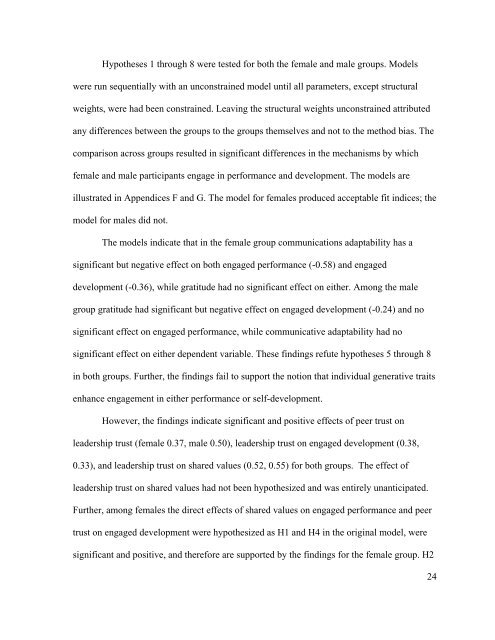GENERATIVE CHARACTERISTICS AS ANTECEDENTS OF ...
GENERATIVE CHARACTERISTICS AS ANTECEDENTS OF ...
GENERATIVE CHARACTERISTICS AS ANTECEDENTS OF ...
Create successful ePaper yourself
Turn your PDF publications into a flip-book with our unique Google optimized e-Paper software.
Hypotheses 1 through 8 were tested for both the female and male groups. Models<br />
were run sequentially with an unconstrained model until all parameters, except structural<br />
weights, were had been constrained. Leaving the structural weights unconstrained attributed<br />
any differences between the groups to the groups themselves and not to the method bias. The<br />
comparison across groups resulted in significant differences in the mechanisms by which<br />
female and male participants engage in performance and development. The models are<br />
illustrated in Appendices F and G. The model for females produced acceptable fit indices; the<br />
model for males did not.<br />
The models indicate that in the female group communications adaptability has a<br />
significant but negative effect on both engaged performance (-0.58) and engaged<br />
development (-0.36), while gratitude had no significant effect on either. Among the male<br />
group gratitude had significant but negative effect on engaged development (-0.24) and no<br />
significant effect on engaged performance, while communicative adaptability had no<br />
significant effect on either dependent variable. These findings refute hypotheses 5 through 8<br />
in both groups. Further, the findings fail to support the notion that individual generative traits<br />
enhance engagement in either performance or self-development.<br />
However, the findings indicate significant and positive effects of peer trust on<br />
leadership trust (female 0.37, male 0.50), leadership trust on engaged development (0.38,<br />
0.33), and leadership trust on shared values (0.52, 0.55) for both groups. The effect of<br />
leadership trust on shared values had not been hypothesized and was entirely unanticipated.<br />
Further, among females the direct effects of shared values on engaged performance and peer<br />
trust on engaged development were hypothesized as H1 and H4 in the original model, were<br />
significant and positive, and therefore are supported by the findings for the female group. H2<br />
24
















